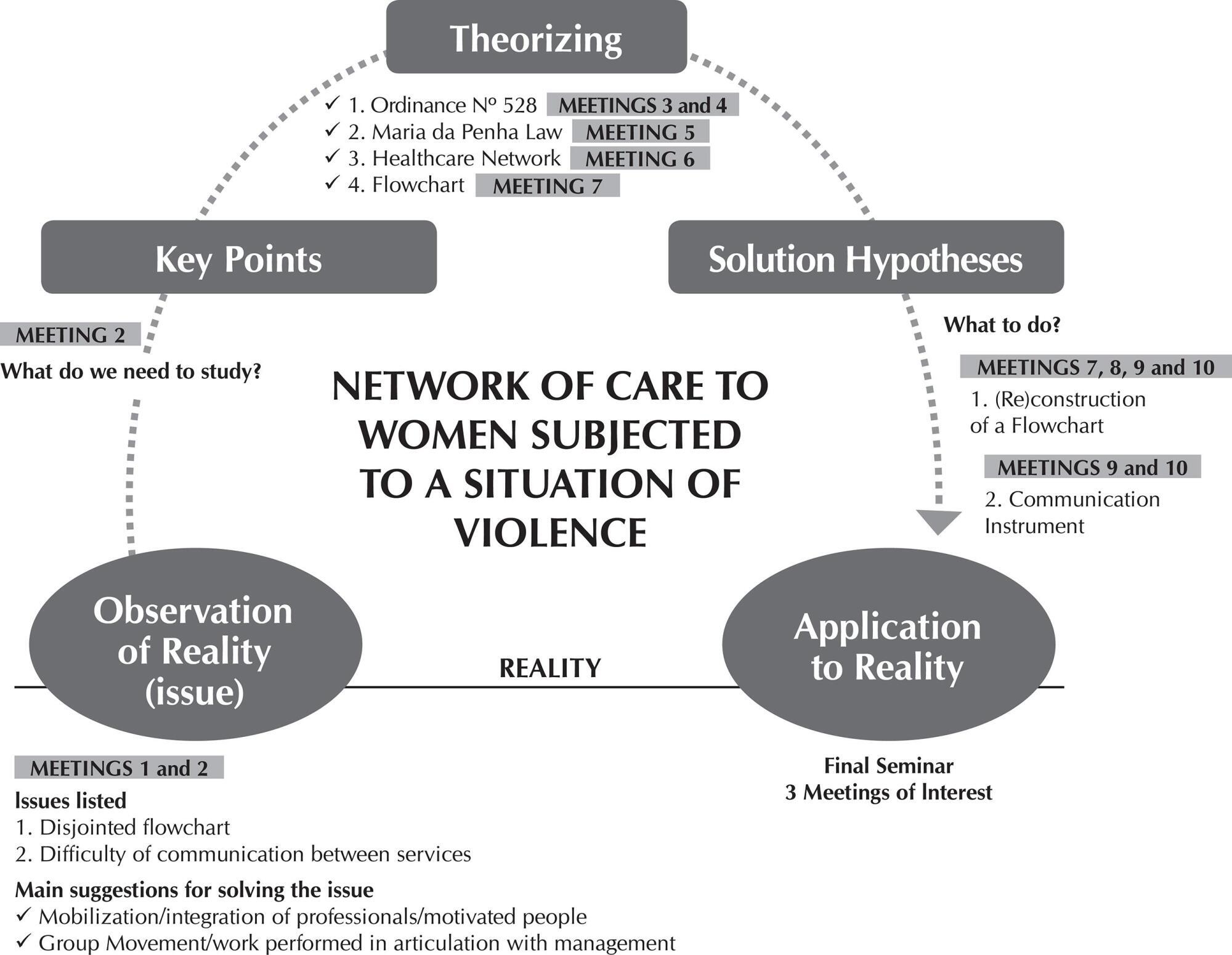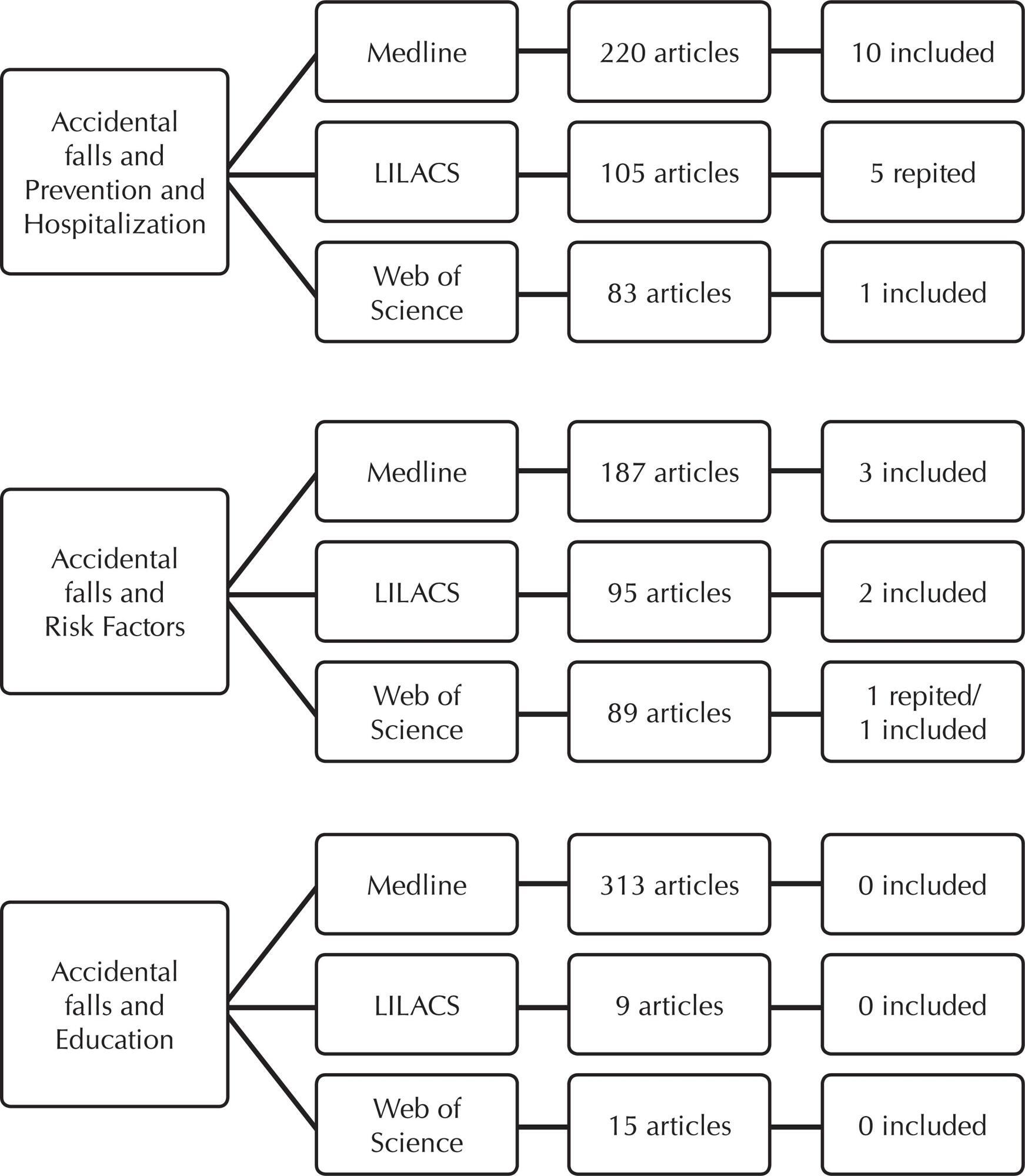-
01-01-2018
A Glance at the Good Practices of Nursing in Primary Care
Revista Brasileira de Enfermagem. 2018;71(3):930-931
Abstract
A Glance at the Good Practices of Nursing in Primary Care
Revista Brasileira de Enfermagem. 2018;71(3):930-931
DOI 10.1590/0034-7167.2018710301
Views0a) Geopolitical territory of production and reproduction of life and work as a setting of GPNuPC Although several actions happen at home, and at the Basic Health Unit, geopolitical territory is the primary focus of GPNuPC. A territory or geopolitical space is where life is produced and therefore is where health needs and vulnerabilities appear. […]See more -
01-01-2018
Um olhar sobre as Boas Práticas de Enfermagem na Atenção Básica
Revista Brasileira de Enfermagem. 2018;71(3):930-931
Abstract
Um olhar sobre as Boas Práticas de Enfermagem na Atenção Básica
Revista Brasileira de Enfermagem. 2018;71(3):930-931
DOI 10.1590/0034-7167.2018710301
Views0a) O território geopolítico de produção e reprodução da vida e do trabalho como cenário da BPEnABAs BPEnAB, mesmo ocorrendo no domicílio, na unidade básica de saúde, têm o território geopolítico como foco primordial. Um território ou um espaço geopolítico, é onde se produz a vida e, portanto, também onde aparecem as necessidades em saúde […]See more -
REFLECTION01-01-2018
The Tidal Model: analysis based on Meleis’s perspective
Revista Brasileira de Enfermagem. 2018;71(2):457-462
Abstract
REFLECTIONThe Tidal Model: analysis based on Meleis’s perspective
Revista Brasileira de Enfermagem. 2018;71(2):457-462
DOI 10.1590/0034-7167-2016-0394
Views0See moreABSTRACT
Objective:
To critically reflect on the conceptual components of the Tidal Model in the application of the mental healthcare process.
Method:
Critical analysis based on the Models of Theory Analysis, focused on the clarity and consistency of the theoretical components of the Tidal Model.
Results:
The clarity of the theory was verified through the demonstration of the following components: functional, presuppositions, concepts and propositions. The consistency is due to the possibility of proven application in several countries with different populations.
Conclusion:
There is a vast field of research and possibilities of application in the Brazilian nursing consultation, in search of usefulness and support in nursing care.
-
EXPERIENCE REPORT01-01-2018
Clinical and epidemiological teaching of dengue through simulated practice
Revista Brasileira de Enfermagem. 2018;71(2):451-456
Abstract
EXPERIENCE REPORTClinical and epidemiological teaching of dengue through simulated practice
Revista Brasileira de Enfermagem. 2018;71(2):451-456
DOI 10.1590/0034-7167-2016-0503
Views2See moreABSTRACT
Objective:
to describe the experience of clinical teaching on dengue and the practice of epidemiological surveillance using problematization methodology.
Method:
report of experience on educational activity with undergraduate nursing students, held in March 2016, at a public university in the city of São Paulo, conceived in four stages: dialogic lecture, active search of Aedes aegypti, case study and simulation of nursing consultation to individuals with dengue.
Results:
The activity allowed to retrieve previous knowledge about the disease, respond to exercises that addressed different clinical situations and epidemiological surveillance, including in situ evaluation of possible mosquito outbreaks, and discuss the need to expand prevention and health of the individual and the community, the impact of the media in the dissemination of cases and the coping difficulties experienced in the different levels of attention.
Conclusion:
the methodology adopted enabled qualified training of students to cope with dengue.

-
EXPERIENCE REPORT01-01-2018
Journal Club: a group of research experience
Revista Brasileira de Enfermagem. 2018;71(2):446-450
Abstract
EXPERIENCE REPORTJournal Club: a group of research experience
Revista Brasileira de Enfermagem. 2018;71(2):446-450
DOI 10.1590/0034-7167-2016-0539
Views0See moreABSTRACT
Introduction:
the Journal Club (JC) is a teaching and learning strategy developed by individuals who meet to discuss scientific articles in periodicals.
Objective:
to describe the experience of the JC strategy at the Group for Studies and Research in Health Services Administration and Nursing Management (Gepag).
Method:
case studies or scientific research demonstration mode of practical experience for the understanding and justification of facts.
Results:
Gepag JC emerged in 2008 and, in 2014, was computerized with the Google Drive®, in order to increase its scope and optimize the Group›s meetings. From April to May 2014, the instrument was tested and adjusted, resulting in advancements.
Final considerations:
the advantages involved optimizing the time of meetings, facilitation of access to publications of interest to the Group and creating the database to support future research.

-
EXPERIENCE REPORT01-01-2018
Problematization Methodology and Convergent Healthcare Research: praxis proposal in research
Revista Brasileira de Enfermagem. 2018;71(2):440-445
Abstract
EXPERIENCE REPORTProblematization Methodology and Convergent Healthcare Research: praxis proposal in research
Revista Brasileira de Enfermagem. 2018;71(2):440-445
DOI 10.1590/0034-7167-2016-0362
Views1See moreABSTRACT
Objective:
Presenting theoretical subsidies for the nursing care practice based on the possibility of convergence between research practice and educational practice.
Method:
The Convergent Healthcare Research was developed from February to August 2015, with an intersectoral working group formed by 32 participants, including health, social services and public safety professionals. Ten group meetings were organized, based on the Problematization Methodology with Maguerez’s Arch.
Results:
The reflection-action movement resulted in the shared (re)building of the flowchart of care to women subjected to a situation of violence, as a device for communication between the services.
Final considerations:
The research practice based on the Problematization Methodology with Maguerez’s Arch proved to be useful and viable in qualitative research, which has as purpose the transformation of the reality studied.

-
REVIEW01-01-2018
Conceptual definitions of indicators for the nursing outcome “Knowledge: Fall Prevention”
Revista Brasileira de Enfermagem. 2018;71(2):431-439
Abstract
REVIEWConceptual definitions of indicators for the nursing outcome “Knowledge: Fall Prevention”
Revista Brasileira de Enfermagem. 2018;71(2):431-439
DOI 10.1590/0034-7167-2016-0686
Views0See moreABSTRACT
Objective:
to construct conceptual definitions for indicators of nursing outcome Knowledge: Fall Prevention, selected for evaluation of hospitalized patients with the nursing diagnosis Risk for falls.
Method:
integrative literature review performed in the LILACS, MEDLINE and Web of Science databases, comprising articles published in English, Spanish and Portuguese languages from 2005 to 2015.
Results:
the final sample of the study was composed of 17 articles. The conceptualizations were constructed for 14 indicators of nursing outcome Knowledge: Fall Prevention focused on hospitalized patients.
Conclusion:
the theoretical support of the Nursing Outcomes Classification (NOC), through the process of constructing the conceptual definitions of the indicators of its results, allows nurses to accurately implement this classification in clinical practice and to evaluate the effectiveness of their interventions through the change of the patients’ status over time.

-
REVIEW01-01-2018
Integrative literature review: sleep patterns in infants attending nurseries
Revista Brasileira de Enfermagem. 2018;71(2):424-430
Abstract
REVIEWIntegrative literature review: sleep patterns in infants attending nurseries
Revista Brasileira de Enfermagem. 2018;71(2):424-430
DOI 10.1590/0034-7167-2016-0480
Views0See moreABSTRACT
Objective:
To identify evidence available in the literature about sleep patterns of infants attending nurseries.
Method:
An integrative review of studies published in Portuguese, English or Spanish available in full text on LILACS, CINAHL, and PubMed databases. The following descriptors sono, lactente and creches or berçários (in Portuguese) and sleep, infant and childcare or nurseries were used for LILACS, CINAHL and Pubmed, respectively. Nine studies were selected and analyzed.
Results:
The main component explored in the studies about sleep pattern is the sleep position of the infants, due to its association with sudden infant death syndrome. The results pointed to the need to promote and develop written guidelines regarding behavioral practices to reduce the risk of this phenomenon.
Conclusion:
Evidence has identified sleep issues, mainly regarding the sleep position of the infant and the environment where the infant sleeps, showing that it is critical to set routines and interventions to improve the quality of sleep care of infants attending nurseries.
Search
Search in:
Nuvem de Tags
Adolescente (85) Atenção Primária à Saúde (239) COVID-19 (91) Criança (91) Cuidados de Enfermagem (269) Educação em Enfermagem (151) Educação em Saúde (139) Enfermagem (930) Enfermagem Pediátrica (86) Estudantes de Enfermagem (77) Estudos de Validação (131) Família (87) Idoso (208) Promoção da Saúde (99) Qualidade de Vida (104) Saúde do Trabalhador (86) Saúde Mental (145) Saúde Pública (82) Segurança do Paciente (150) Tecnologia Educacional (100)



